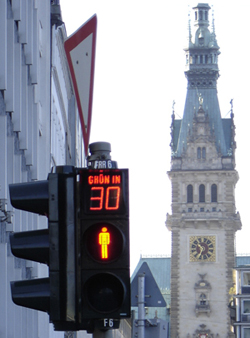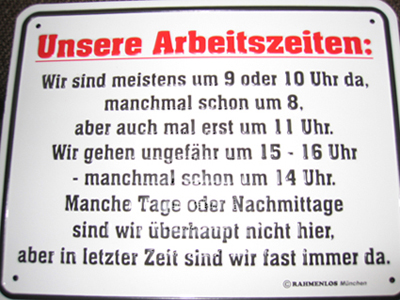The Importance of Time in German Culture:
Visitors to Germany will notice the ubiquity of clocks, the consistent posting of opening times and office hours, and other forms of temporal orientation.
|
|
|
| Signs announce the length of time before the next subway's arrival. |
In the scheme formulated by the anthropologist Edward T. Hall, Germans form a "low-context," "monochronic" culture.
|
|
 |
| This light in Hamburg tells pedestrians how many seconds they have to wait for the green. Note the clock tower in the background. | |
That means that they take time commitments seriously, do one thing at a time, and concentrate on the job at hand. Hence the saying, "Arbeit ist Arbeit und Schnaps ist Schnaps." North Americans, particularly those of Northern European descent, attach somewhat similar values to time, but Germans carry the attitude further. The contrast can lead to friction when members of the two cultures try to work together.
Promptness is a key virtue: "Fünf Minuten vor der Zeit / Ist die wahre Pünktlichkeit" (Five minutes ahead of time is true punctuality). Tardiness is held to be inconsiderate, even insulting, to those who must wait.
Grammatical Time:
English and German share six basic tenses (the present, simple past, present perfect, past perfect, future, and future perfect), but German has no "progressive tenses": "I am watching you", "She has been visiting her sister", "We had been wanting to leave for a long time", "I will be seeing him next week", etc.
To indicate a continuous action that began in the past and extends to the present, German uses the present tense and a time expression, usually a prepositional phrase with "seit". Often the adverb "schon" emphasizes the duration:
| Ich warte seit einer Stunde. |
| I have been waiting for an hour. |
| Sie studiert schon elf Semester. |
| She has been studying eleven semesters. |
| Er macht das schon lange. |
| He's been doing that for a long time. |
Telling Time (Wie spät ist es?):

|
 |
 |
 |
 |
|
Es ist ein Uhr 45.
Es ist drei Viertel zwei. Es ist Viertel vor zwei. Es ist 15 Minuten vor zwei. Es ist 45 Minuten nach eins (1.45). |
Es ist 5 Uhr 56 (5.56).
Es ist 4 (Minuten) vor sechs. |
Es ist 10 Uhr 12 (10.12).
Es ist 12 (Minuten) nach 10. |
Es ist 7 Uhr 30 (7.30).
Es ist halb 8. |
Es ist 8 Uhr 20 (8.20).
Es ist 20 (Minuten) nach 8. |
|
Or, assuming p.m.: |
||||
|
Es ist 13 Uhr 45
(13.45). |
Es ist 17 Uhr 56
(17.56). |
Es ist 22 Uhr 12
(22.12). |
Es ist 19 Uhr 30
(19.30). |
Es ist 20 Uhr 20
(20.20). |
Note that when the time is written in numerals only, a period, rather than a colon, normally separates the hours and minutes. Often the "Uhr" is abbreviated as "h": "Es ist 8h 25."
Some Rules for Adverbial Time Phrases:
1) Definite time expressions without prepositions are in the accusative:
| Nächste Woche mache ich das. |
| I'll do that next week. |
| Ich hätte die ganze Nacht tanzen können. |
| I could have danced all night. |
| Wir haben ihn letzten Dienstag gesehen. |
| We saw him last Tuesday. |
2) Indefinite time is in the genitive (as, of course, are time expressions with "während"):
| Eines Tages wird er alles verstehen. |
| One day he'll understand everything. |
| Eines Abends sollen wir ins Kino gehen. |
| We should go to the movies some evening. |
| Eines Nachts ist er aufgetaucht. |
| He showed up one night. |
(Note that in this last example "die Nacht" is treated as if it were masculine, rather than feminine. The analogy to the other masculine parts of the day is stronger than the grammatical gender).
3) Definite time expressions with prepositions:
When defining a spacial area, the prepositions "an", "in", "vor" are so-called two-way prepositions, which take either the accusative or the dative. But in time expressions, they take the dative. The preposition "an" is mostly used for parts of the day (except for "die Nacht") and days of the week.
| Am Montag (am Abend, am Morgen) esse ich oft Pizza. |
| On Monday (in the evening, in the morning) I often eat pizza. |
| Am Wochenende fliege ich nach Paris. |
| On the weekend I'm flying to Paris. |
| Im Winter (im Sommer) scheint die Sonne. |
| The sun shines in the winter (in summer). |
| In der Nacht sind alle Katzen grau. |
| At night all cats are gray. |
| In einer Woche fahren wir in die Schweiz. |
| We're driving to Switzerland in a week. |
| Vor dem Essen soll man spazieren gehen. |
| One should take a walk before eating a meal. |
| Vor einer Woche war ich noch in Florida. |
| A week ago I was still in Florida. [N.B.: vor means either "before" or "ago"] |
| Vor einem Jahr habe ich das nicht gewusst. |
| A year ago I didn't know that. |
Of course "seit" and "nach" always take the dative. N.B.: "seit" means "since" or "for" and is used together with the present tense to designate a time span that began in the past and continues into the present.
| Nach der Deutschstunde muss ich diese Vokabeln lernen. |
| After German class I have to learn these vocabulary items. |
| Wir studieren seit einem Jahr in Berlin. |
| We've been studying in Berlin for a year. |
| Seit einem Monat wohnt sie in New York. |
| She's been living in New York for a month. |
|
|
 |
| Our work hours: We're usually here at 9 or 10, sometimes as early as 8, but occasionally not till 11. We usually leave approximately at 3 or 4 p.m. - sometimes as early as 2. Some days or afternoons we're not here at all, but recently we're almost always here. | |
Note that while English defines the beginning of an action or event negatively ("not until"), German does it positively:
| Er kommt erst um 11. |
| He won't come until 11. |
| Wir haben uns erst heute Abend kennengelernt. |
| We haven't met before this evening. |
| Ich bin erst um 2 eingeschlafen. |
| I didn't fall asleep until 2. |
| Das Kind ist erst drei Jahre alt. |
| The child is only three years old. |
When defining a spacial area, the prepositions "über" and "auf" take either the accusative or the dative. But in time expressions, they take the accusative.
| Was machst du übers Wochenende? |
| What are you doing over the weekend? |
| Er geht auf ein Jahr nach Mainz. |
| He's going to Mainz for a year. |
Of course "für", "um", and "gegen" always take the accusative.
| Er geht für ein Jahr nach Mainz. |
| He's going to Mainz for a year. |
| Er ist um sechs aufgestanden. |
| He got up at six. |
| Wir wollen gegen acht losfahren. |
| We want to leave around eight. |
Word order: time before place, general time before specific.
| Wir fliegen heute Morgen um 8 nach Frankfurt. |
| We're flying to Frankfurt this morning at 8. |
|
|
|
| General medical practice. Naturopathic treatment. Sports medicine. Acupuncture. Chiropraxis. Pain therapy. Please telephone ahead. | |
